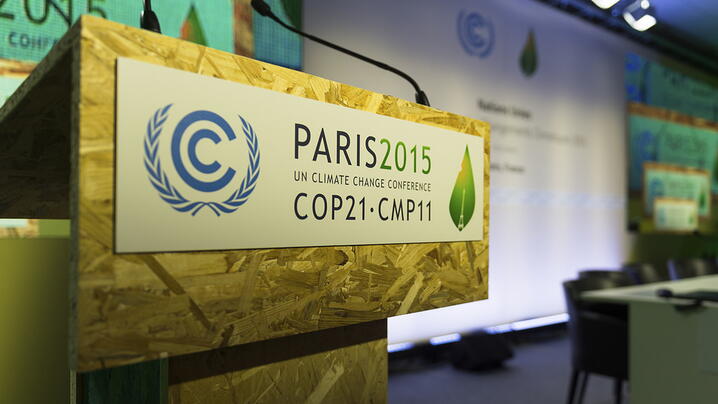
An historic agreement to combat climate change and unleash actions and investment towards a low carbon, resilient and sustainable future was agreed by over 190 nations in Paris on Saturday December 12, 2015. To reach these ambitious and important goals, the agreement recognizes the key role of local governments in strengthening resilience to climate change.
What is COP?
The term ‘COP’ stands for Conference of Parties. ‘Parties’ is a reference to the (now) 196 signatories of the United Nations Framework Convention on Climate Change, or UNFCCC, as it is called. The Framework Convention came into force in 1994, two years after its text was finalized at the Earth Summit in Rio de Janeiro in Brazil. Each year, signatories to the Convention meet to advance that objective and to discuss and adopt measures to address climate change and its impacts on our society. This COP was the twenty-first to take place since the signing of the UNFCCC, hence COP21.
Why is COP21 so important?
The final agreement is the first accord committing all the world’s countries to reducing greenhouse emissions to help slow the pace of climate change. It sets a goal of limiting the planet’s temperature rise to below 2 degrees Celsius, or 3.6 degrees Fahrenheit, above preindustrial levels. Scientific research has concluded that warming beyond this point will unleash the most severe impacts of global warming, including more frequent and destructive storms, widespread water shortages, famine, extreme flooding and dramatically rising sea levels. But while the agreement commits its 195 nations to cut emissions and report progress on a national level, at least one-third of the carbon budget remaining to stay under 2 degrees Celsius is in the control of cities and local governments, and everyone at COP21 seemed to know it.
What can I do?
According to the UN, talks ended with more than 7,000 cities and regions committed to slashing carbon emissions through their own local actions. Collectively, these communities represent a fifth of the world’s population. As part of these global efforts, Americans have demonstrated their dedication to climate action through a wide variety of commitments, some include:
- Compact of Mayors: 117 United States mayors have signed onto the Compact of Mayors pledge. The Compact establishes a common platform to capture the impact of cities’ collective actions through standardized measurement of emissions and climate risk, and consistent, public reporting of their efforts.
- Under-2 MOU: States including California, Oregon, Vermont, Washington, Minnesota, New Hampshire, and New York have signed onto the Under-2 MOU, which commits signatories to cut greenhouse gas emissions 80-95% below 1990 levels, and expand and collaborate on smart technology and policy aimed reducing climate pollutants.
- American Business Act on Climate Pledge: 154 companies have signed the White House’s American Business Act on Climate Pledge. These companies have operations in all 50 states, employ nearly 11 million people, represent more than $4.2 trillion in annual revenue and have a combined market capitalization of over $7 trillion.
- American Campuses Act on Climate Pledge: 311 colleges and universities representing over 4 million students have demonstrated their commitment to climate action by joining the American Campuses Act on Climate Pledge.
The legally binding international climate agreement negotiated in Paris last month, offers a glimmer of hope, though it will still not be enough to avert irreversible consequences from climate change. But by recognizing the importance of the world's cities and regions, the agreement has, however, increased the prospects of a more effective and sustained global effort to deal with the impacts of climate change, and to limit further global warming.
If you’re interested in learning how your community can join the #ActOnClimate, stay tuned for future ICMA webinars on COP21. Additionally, the following White House factsheet gives you an in-depth overview of the Paris Agreement.
New, Reduced Membership Dues
A new, reduced dues rate is available for CAOs/ACAOs, along with additional discounts for those in smaller communities, has been implemented. Learn more and be sure to join or renew today!
